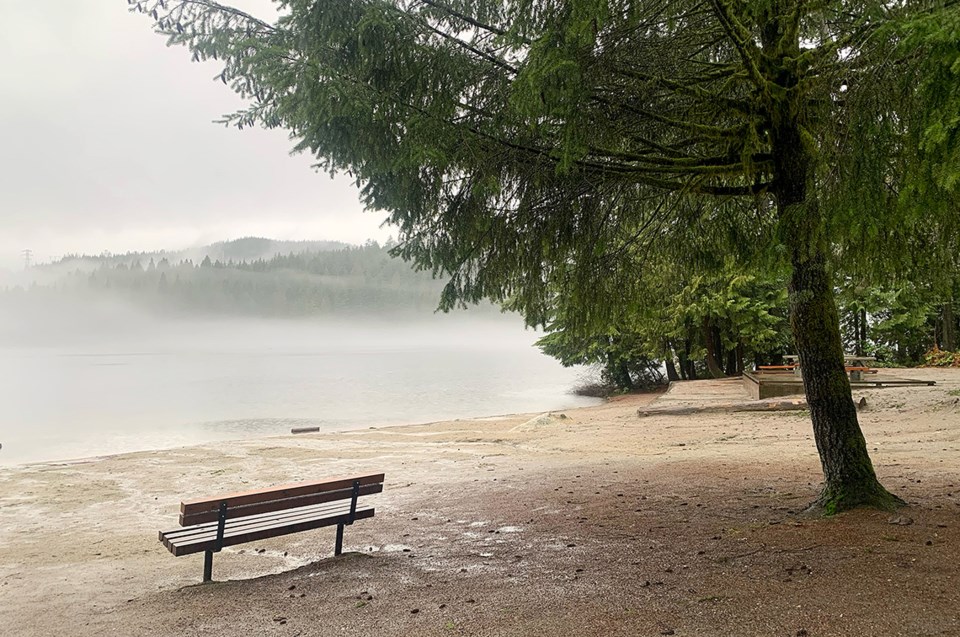A popular recreational lake in Port Moody that’s used by tens of thousands of visitors each year could be altered forever if Imperial Oil decides to decommission a dam that’s been there for almost a century.
Ali Tejpar, a project manager for the oil company, says water levels at Sasamat Lake, in Belcarra/təmtəmíxʷtən Regional Park, would drop by two metres if the dam, that's next to the Sasamat Outdoor Centre, is removed.
The dam was originally built by Imperial Oil about 100 years ago to collect water for use at its refinery in nearby Ioco. It was replaced by a new dam in the 1960s.
But when the refinery was converted to a distribution terminal in 1995, its water needs reduced substantially. An inspection of the dam in 2019 that discovered some seepage has the company considering its options, Tejpar said.
While decommissioning the dam is one possibility, he said Imperial Oil could also build a new dam in the same location that would include a new pedestrian bridge.
Tejpar said to help determine its path forward, Imperial Oil, as well as design and engineering consultants from Stantec, have been talking with various stakeholders like local First Nations, Metro Vancouver, the villages of Belcarra and Anmore, the City of Port Moody and the Sasamat Outdoor Centre since March, 2021.
“We’re trying to understand from the stakeholders where their concerns are,” Tejpar said.
The concerns
Port Moody Mayor Meghan Lahti said a presentation made to council last Tuesday (Jan. 10) by Imperial Oil and Stantec was the first she’d heard of the dam dilemma.
She told the Tri-City News the uncertainty about the future of the dam is concerning.
“Port Moody, as well as the entire Metro Region, see this area as an important integral recreation and environmentally significant area,” Lahti said.
“Any change, particularly in the interface where people recreate on or near the lake will bring concerns.”
Metro Vancouver has identified several concerns around the future of the dam, said Steven Schaffrick, division manager for the parks central area of Metro Vancouver Regional Parks.
“We would like to preserve the visitor experience, which involves ensuring water quality, beach experience and other key features such as ‘dog rock’ and the floating walkway are not diminished,” he said in a statement to the Tri-City News, adding any change in the water level could also impact fish and amphibian habitat which could hurt recreational fishing in Sasamat Lake.
Stantec’s Joel Pineau said while decommissioning the dam would cause long-term changes to wetlands and riparian vegetation in the area, the ongoing viability of local and regional wildlife populations isn’t expected to change.
He said there would be limited temporary impacts to fish and wildlife habitat immediately surrounding the footprint of the dam, but they would rebound as new wetlands form.
Kristen Hyodo, the executive director of the Sasamat Outdoor Centre, said the fate of the dam “is significant to our organization and our community.”
She said decommissioning the dam has the “potential to impact” programming at the centre, which has provided outdoor education and camp experiences to about 5,000 people per year since 1962.
Tejpar said a geotechnical inspection of the existing dam is scheduled to be completed in February that will be used to guide the design process if a new dam is to be constructed.
He added, however, a final decision on the dam’s future is still a ways off as Imperial Oil continues to collect feedback.
Replacing the dam is the preferred option
Schaffrick said Metro Vancouver would prefer the dam be replaced and discussions with Imperial Oil are ongoing about the design and management of a potential new dam.
Lahti believes an arrangement with Metro Vancouver to preserve the lake as it is would be a solution that works for everyone.
“While Sasamat Lake does exist in Port Moody, it is a regional park as well and serves an important role in the region.”
Lahti said she hopes Imperial Oil will expand its engagement to include the general public as well. She even offered city space to host consultation and information meetings.
Tejpar conceded, though, there’s no immediate plan to engage the public at large.
“We want to make a fact and data-driven decision."



